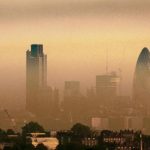 While air pollution generally fell throughout the world as a result of the reduced mobility during the COVID pandemic, it remains an ongoing problem, not least in areas such as the American West, which suffers from intense fires each autumn. As such, poor air quality remains an enduring issue for many.
While air pollution generally fell throughout the world as a result of the reduced mobility during the COVID pandemic, it remains an ongoing problem, not least in areas such as the American West, which suffers from intense fires each autumn. As such, poor air quality remains an enduring issue for many.
This is resulting in a worsening of the flu season with the various respiratory problems associated with that. New research from Columbia Business School also shows that air pollution impacts the crime rate in affected regions too.
The researchers conducted a couple of meta-analyses and found that there is a significant link between air pollution and unethical behaviors. The analysis reveals that pollution causes the kind of distress that inhibits our moral reasoning and therefore prompts us to focus instead on self-interest.
“High levels of air pollution can trigger psychological and physiological stress, which causes people to think and act less ethically,” the researchers say. “Polluted air can lead to a toxic society when it produces crime. This impact is especially important today as climate change contributes to major pollution events such as wildfires across the country.”
Pollution and anxiety
In total, 14 quantitative studies were assessed to explore the link between anxiety and unethical behavior. The analysis clearly shows that air pollution causes a rise in anxiety, which in turn results in a variety of unethical behaviors, including violent crime, cheating, and so on.
Importantly, these findings were consistent across the world, although the researchers do nonetheless urge a degree of caution before assigning the causal connection to all regions and contexts. They suggest that factors such as housing conditions, healthcare, and general cultural diversity could also play a role.
“Our conclusions only scratch the surface of the ways in which pollution – and by extension, climate change – affect our society and behaviors. Policymakers must appreciate these links to address the root causes of human suffering and violence,” they conclude. “To further this work, future research must pinpoint the relationships between specific air pollutants and specific forms of unethical behavior, so that we can truly begin to mitigate societal ills resulting from pollution.”